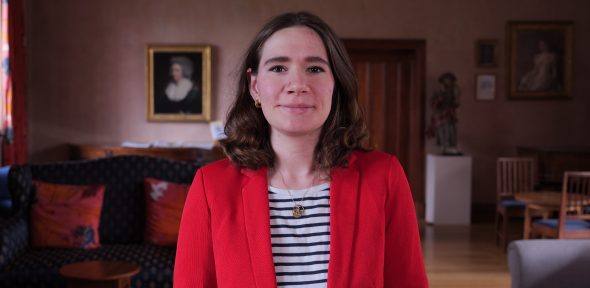
Room 101
Faculty of Modern and Medieval Languages and Linguistics
Raised Faculty Building
University of Cambridge
Sidgwick Avenue
Cambridge
CB3 9DA
United Kingdom
Maria Roca Lizarazu received her PhD in German Studies from the University of Warwick (2017) for a thesis on literary representations of Holocaust memory in contemporary German-language writing by the third generation. After completing her doctorate, she held postdoctoral fellowships at the Institute of Advanced Study, University of Warwick and the Institute for Languages, Cultures and Societies, London (formerly IMLR), before commencing a three-year Leverhulme Early Career Fellowship at the University of Birmingham (2018-2021). Her Leverhulme-funded research project explored literary world- and future-making in a broad range of texts by so-called postmigrant authors in contemporary Germany. Prior to joining Cambridge, she worked as a postdoctoral researcher in Creative Futures at the Moore Institute, University of Galway (2021-2023). Her first monograph, Renegotiating Postmemory. The Holocaust in Contemporary German-language Jewish Culture was published with Camden House in 2020.
Topics on which Dr Roca Lizarazu teaches include: Modernising the Theatre for Ge 5; Heimat und Alptraum for Ge 6; Transforming the Stage for Ge12; Futures and Utopianism for Ge13; translation for paper GEB2.
Dr Roca Lizarazu specialises in German-language literature and culture of the 20th and 21st centuries. Her research interests include cultural production by and about minority subjects in contemporary Germany, including Jewish, Turkish and Black German perspectives, as well as cultural engagements with (post-)migration, transnationalism, and citizenship. More recently, Dr Lizarazu has engaged with cultural responses to right-wing and racialised violence in contemporary Germany. Across these topics, she has an overarching interest in temporality, especially questions of remembrance and futurity in relation to violent pasts and presents. In this context, she explores in the contributions that arts-based approaches and creative experimentation can make to developing critical methodologies and practices of memory-, future-, and world-making. Dr Lizarazu also has a keen interest in creative methods and collaborations as part of this research.
- ‘Unrecognizable Subjects, Grief, and Repair in Esther Dischereit’s Blumen für Otello’, Oxford German Studies, 53.1 (2024), pp. 107-121.
- With Rebecca Braun, and Orla Lehane, ‘Literary Futures: Harnessing Fiction for Futures Work’, Futures, 158 (2024), https://doi.org/10.1016/j.futures.2024.103348.
- ‘“Stories one tells in dark times”: Fabulation, Fugitivity, and Futurity in Olivia Wenzel’s 1000 Serpentinen Angst’, The German Quarterly, 97.1, pp. 75-92.
- ‘Literary Archives and Alternative Futures. Memories of Labor Migration in Contemporary Turkish German Fiction’, in: The Palgrave Handbook of European Migration in Literature and Culture, ed. Corina Stan and Charlotte Sussman (Palgrave, 2023), pp. 255-270.
- ‘“We will be ephemeral” – Encounter, Community and Unsettled Cosmopolitanism in Senthuran Varatharajah’s Vor der Zunahme der Zeichen’, in: Exploring the Transnational Neighbourhood, ed. Stephan Ehrig, Britta Jung and Gad Schaffer (Leuven University Press, 2022), pp. 69-92.
- ‘Irreconcilable Differences: The Politics of Bad Feelings in Contemporary German Jewish Culture’, Edinburgh German Yearbook 14 (2021), pp. 75-96.
- ‘Moments of Possibility. Holocaust Postmemory, Subjunctivity, and Futurity in Katja Petrowskaja’s Vielleicht Esther (2014) und Robert Menasse’s Die Hauptstadt (2017)’, Forum for Modern Language Studies 56.4 (2021), pp. 406-426.
- ‘Postmigrant Renegotiations of Identity and Belonging in Contemporary Germany’, Humanities 9.2 (2020), available online: https://doi.org/10.3390/h9020042.
- Renegotiating Postmemory. The Holocaust in Contemporary German-language Jewish Literature (Camden House, 2020).


